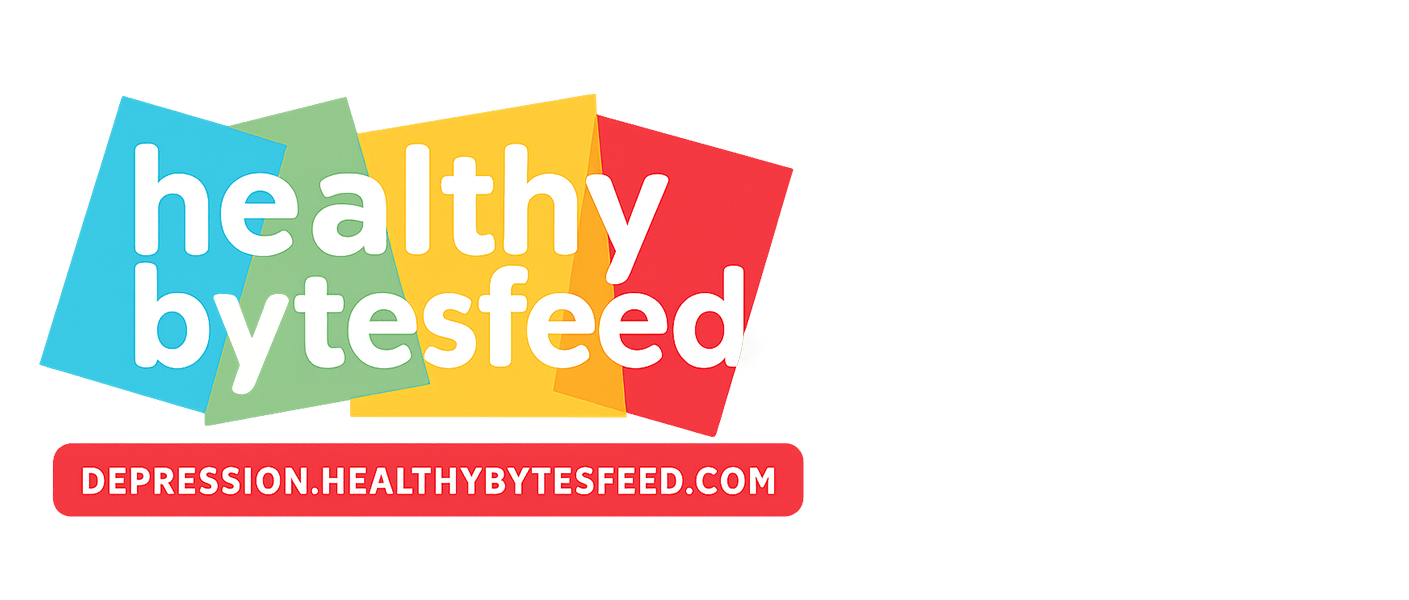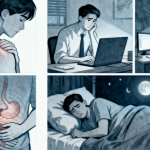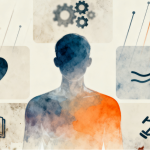- 1、 First, Stay Alert: These “Minor Issues” May Be Physical Warnings of Depression
- 2、True Stories: “Minor Issues” Pushed Through, Turned Into Depression
- 3、Key Points: 3 Low-Cost Self-Check Methods You Can Do At Home (With Practical Tools)
- 4、Found Abnormalities After Self-Check? 3 Correct Steps to Take (Avoid Mistakes)
- 5、Conclusion: Don’t Let “Pushing Through” Break You
- 6、References
- 7、Disclaimer
“Scrolling through phones until 3 AM, craving sweets late at night, and snapping over nothing”—these seemingly “common modern problems” may hide early signs of depression. Data from the U.S. National Institute of Mental Health (NIMH) shows that approximately 75% of people with depression first experience physical symptoms like staying up late, binge eating, and low energy, rather than “low mood.” Yet these signs are often dismissed as “stress” or “poor self-control” ¹.
As a creator focused on mental health science communication, I’ve received countless messages from readers: “I thought it was just a messed-up schedule, but after pushing through for 3 months, I found out it was depression” “I gained 20 pounds from binge eating—turns out it’s not gluttony, it’s illness.” In fact, early detection of depression doesn’t require professional equipment. Mastering 3 low-cost self-check methods lets you catch these “distress signals” from daily abnormalities.
First, Stay Alert: These “Minor Issues” May Be Physical Warnings of Depression
NIMH defines depression as a “mind-body disease.” Imbalances in brain neurotransmitters (such as reduced serotonin and dopamine) directly disrupt physical functions. The “staying up late, binge eating, and mood swings” many people ignore are essentially the body sending you an alarm:
1. Sleep Abnormalities: Not “Insomnia”—It’s “A Brain That Can’t Shut Off”
Ordinary insomnia is often caused by “worrying too much,” but sleep problems linked to depression have distinct characteristics: either early-morning awakening (e.g., consistently waking up at 3 AM and being unable to fall back asleep) or daytime hypersomnia (sleeping 10 hours yet still feeling tired), accompanied by intense “fatigue” upon waking. Maya (pseudonym), a 25-year-old American designer, once said: “I thought it was from working overtime, but I realized I was lying awake scrolling until dawn—not because I didn’t want to sleep, but because my brain was stuck like a broken machine” ².
2. Eating Disorders: Not “Gluttony”—It’s “Filling Emotional Void with Food”
Depression disrupts the brain’s “reward circuit,” leading people to seek temporary comfort through binge eating or anorexia. Binge eaters might finish 3 takeout meals without feeling full, while those with anorexia can’t even swallow their favorite foods. NIMH research notes that such eating abnormalities are often “emotionally triggered”—like sudden binge eating after a breakup or persistent anorexia after job loss ³.
3. Mood Swings: Not “A Bad Temper”—It’s “A Broken Emotional Switch”
Ordinary bad moods can be relieved by talking or exercising, but depression-induced mood swings are “uncontrollable outbursts”: crying for half an hour over a colleague’s criticism, or snapping and throwing things for no reason, followed by intense guilt. This happens because depression overactivates the amygdala (the emotional center), leaving people “controlled by their emotions” ¹.
True Stories: “Minor Issues” Pushed Through, Turned Into Depression
Story 1: From “Staying Up Late Scrolling” to “Unable to Work”—She Missed the 3-Month Golden Intervention Window
In 2023, Claire (pseudonym), a teacher in Texas, U.S., started staying up late due to end-of-semester stress: “At first, I graded papers until midnight, then got used to scrolling until 4 AM, relying on coffee to get through the day.” Colleagues told her “don’t push through,” but she dismissed it as “job burnout.” It wasn’t until 3 months later, when she developed binge eating (finishing 2 pizzas in one sitting) and emotional breakdowns (suddenly crying in class), that she was diagnosed with moderate depression ⁴.
Doctors told her the late nights were no longer a “schedule issue”—sleep deprivation further lowers serotonin levels, creating a vicious cycle: “stay up late → worse mood → want to stay up later.” “If I’d noticed sleep abnormalities as a warning sign earlier, I wouldn’t have ended up unable to work,” Claire said. She gradually recovered after 2 months of regular sleep intervention.

Story 2: “An Emotional Void Hidden by Binge Eating”—He Learned a Lesson Through Weight Gain
Jake (pseudonym), a student at the University of Pennsylvania, started binge eating after a breakup: “Every night I’d hide in my dorm eating chips and cake until I felt sick, gaining 30 pounds in a month.” He thought it was “eating to cope with sadness,” but when he developed self-loathing and skipped classes, his roommate dragged him to get checked, and he was diagnosed with mild depression ⁵.
NIMH researchers analyzed that Jake’s binge eating was typical “emotional eating”—his brain couldn’t produce normal feelings of pleasure, so he sought temporary relief through food. “What I was pushing through wasn’t hunger, but emotional pain from the breakup,” Jake said. By keeping a “food + mood journal” for self-check, he realized his binge eating always happened on nights he thought about his ex-girlfriend.

Key Points: 3 Low-Cost Self-Check Methods You Can Do At Home (With Practical Tools)
Combining NIMH clinical screening criteria, I’ve compiled 3 zero-cost, high-accuracy self-check methods that require no professional knowledge:
Method 1: “3-Day Physical Signal Tracking”—Catch Invisible Abnormalities
Core Logic: Distinguish “normal fluctuations” from “depression warnings” by recording “quantifiable changes” in sleep, eating, and energy.
Practical Steps:
1.Prepare a chart and record 3 types of data:
Sleep: Bedtime, wake-up time, and whether you wake up early (record to the minute);
Eating: Number of meals, presence of binge eating/anorexia, and mood while eating (e.g., “Ate 1 pack of cookies when irritable”);
Energy: 1-10 rating (1 = unable to move, 10 = full of energy), and record low-energy periods.
2.Warning Signs: Be alert if 2 or more abnormalities appear:
Sleep: Waking up between 2-4 AM for 3 consecutive days, or sleeping over 10 hours during the day;
Eating: Eating more than 5 times a day without hunger, or not eating voluntarily for 1 full day;
Energy: Daily rating ≤ 4 with no physical labor cause.
Method 2: “Mood Trigger Journal”—Uncover the Truth Behind “Emotional Outbursts”
Core Logic: NIMH notes that mood swings from depression often have “hidden triggers”—journaling helps identify them accurately.
Practical Steps:
1.Immediately after an emotional outburst (e.g., irritability, crying), record 3 questions:
Trigger Event: “Colleague rushed me to finish the project” “Saw ex’s social media post” (specific details);
Physical Reaction: “Racing heart,” “Trembling hands,” “Craving sweets” (physical signals);
Duration: “Calmed down in 10 minutes” “Felt bad for over 1 hour” (distinguish normal vs. abnormal mood).
2.Warning Signs: Be alert if there are 3+ “emotional outbursts with no clear trigger” in a week, or if outbursts last over 1 hour.
Method 3: “Simplified PHQ-9 Self-Check”—Home Version of Authoritative Standards
Core Logic: Adapted from NIMH’s recommended PHQ-9 scale, retaining 4 core questions without professional jargon.
Self-Check Questions (Frequency in the Past 2 Weeks):
1.Little interest or pleasure in doing things? (0 = Not at all, 1 = Several days, 2 = More than half the days, 3 = Nearly every day)
2.Feeling down, depressed, or hopeless? (Same rating scale)
3.Trouble falling or staying asleep, or sleeping too much? (Same rating scale)
4.Feeling bad about yourself—or that you are a failure, or have let yourself or your family down? (Same rating scale)
Score Interpretation: Total score ≥ 5 = Need attention; ≥ 10 = Recommend contacting a professional ¹.
Note: This is a screening tool, not a substitute for diagnosis. As Claire said: “Don’t panic if your score is high—seeking medical help promptly is key.”
Found Abnormalities After Self-Check? 3 Correct Steps to Take (Avoid Mistakes)
1. Stop “Self-Criticism”: It’s Not Your Fault
Don’t call yourself “lacking self-control” or “overdramatic”—NIMH emphasizes that staying up late and binge eating are “symptoms” of depression, just like a fever from a cold. They don’t mean you’re “not strong enough.” Claire’s experience proves: “Accepting that you’re ‘sick’ is the first step to getting better.”
2. Try “Micro-Interventions”: 3 Low-Cost Relief Tips
Sleep: Stick to a fixed wake-up time (even if you stayed up late), and get 10 minutes of sunlight in the morning (boosts serotonin production);
Eating: Prepare “small portions of healthy snacks” (e.g., nuts, fruit) to replace high-sugar foods;
Mood: “5-Minute Breathing Exercise”—Inhale for 4 seconds, hold for 2 seconds, exhale for 6 seconds to calm down quickly.
3. Critical Boundaries: Seek Help If These Occur
Unable to eat or sleep normally for over 2 weeks;
Having negative thoughts like “Life is meaningless”;
Self-check score ≥ 10 with worsening mood.
NIMH recommends finding a nearby counselor through the American Psychological Association’s official website (link in References) ¹.
Conclusion: Don’t Let “Pushing Through” Break You
Staying up late, binge eating, and mood swings may seem “minor,” but they could be the “first card” depression sends you. NIMH research shows that the recovery rate of depression patients who receive early detection and intervention is 60% higher than those who push through ¹.
I hope everyone reading this knows: Self-check isn’t “being paranoid”—it’s being responsible for yourself. When your body sends abnormal signals, don’t push through. Use these 3 low-cost methods to check in, and catch yourself before you fall.
References
National Institute of Mental Health (NIMH). Depression Topic Page. https://www.nimh.nih.gov/health/topics/depression
The Wall Street Journal. “Why You Can’t Sleep at 3 AM? It Might Be Depression, Not Stress.” April 12, 2023. https://www.wsj.com/health/mental-health/insomnia-depression-link-11681286401
National Institute of Mental Health (NIMH). “Eating Changes in Depression: A Neurobiological Perspective.” https://www.nimh.nih.gov/research/research-conducted-at-nimh/eating-behaviors-depression
Texas Education Agency. “Teacher Mental Health: When Burnout Turns to Depression.” September 5, 2023. https://tea.texas.gov/resource-center/teacher-mental-health-burnout-depression
University of Pennsylvania. “College Student Emotional Eating: A Warning Sign for Depression.” October 18, 2022. https://www.vpul.upenn.edu/healthway/emotional-eating-depression.html
National Institute of Mental Health (NIMH). Copyright Policy. https://www.nimh.nih.gov/site-info/policies#part_2718
Disclaimer
1.Part of the data and content in this article is sourced from the U.S. National Institute of Mental Health (NIMH) official website and public news reports (see References for details). The text has been used in compliance with NIMH’s copyright policy, with no misleading modifications to the original meaning and no use of images from its website.
2.The self-check methods and relief tips mentioned in this article are for popular science reference only and do not constitute any medical advice, diagnosis, or treatment plan.
3.The external links included in this article are valid and relevant to the content, but the accuracy, completeness, and timeliness of the linked webpage content are not guaranteed.
4.If you or someone around you has related health issues, please consult a qualified doctor or legitimate medical institution and follow professional guidance for evaluation and intervention.







Discuss